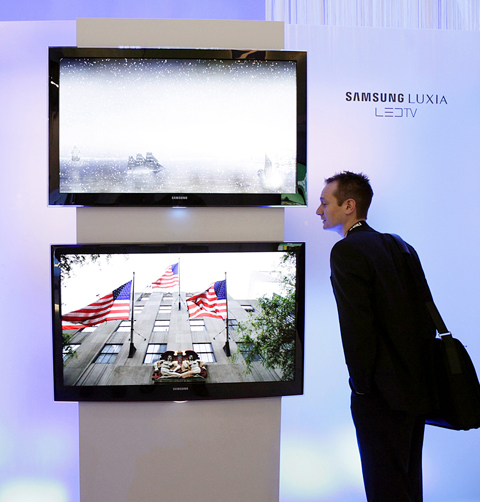The penetration rate of LED backlights in LCD TVs is expected to grow to 40 percent in 2013 from 3 percent this year, with TV makers including market leader Samsung Electronics Co planning to launch more LED TVs next year, market researcher DisplaySearch said.
In 2014, the penetration of LED backlights in LCD TV panels could exceed 50 percent, surpassing the use of cold-cathode fluorescent lamps (CCFL), the Austin, Texas-based research house said in a report last month.
“Backlight units for LCD TVs are expected to be the next growth opportunity for the LED industry,” DisplaySearch said in the report, adding that “leading brands such as Samsung, LG, Sharp and Philips all expected to mass produce LED backlight LCD TVs in 2010.”

PHOTO: AP
Shipments of LED backlights used in LCD TV panels could quadruple to 15.1 million units next year, from 3.6 million units this year, pushing use of the sleeker and power-saving LED TV panels up to 10 percent the same year, the research house forecast.
Samsung said it sold 500,000 LED TVs in the three months following their launch in March, helped by strong demand in the US and Europe.
The fast uptake of LED backlights in PCs and TVs will benefit local LED makers such as Taiwan’s top LED chipmaker, Epistar Corp (晶電), a report from Taipei-based Capital Securities (群益證券) said.
Demand for LED chips may grow at least threefold this year to 7.9 billion units from 1.73 billion units, Capital Securities said in the report. Next year, LED chip demand may expand further to 17.7 billion units, it said.
Epistar has said faster-than-expected uptake of LED TVs and netbooks outfitted with LED panels caused a supply glut since March and it expected strong demand to help increase revenues by a double-digit percentage this quarter from last quarter.
The nation’s major LED chipmakers, Epistar and Formosa Epitaxy Inc (璨圓), may see their revenues grow more than 28 percent next year to NT$13.97 billion (US$426 million) and NT$2.21 billion respectively, from NT$10.88 billion and NT$1.72 billion this year, Capital Securities said.
DisplaySearch said shipments of LED backlights for computers and TVs could hit 434.8 million units in 2013, compared with 84.9 million this year, making LED backlights the most common light source, accounting for 54 percent of all LCD computer and TV panels.
Shares of Epistar fell 1.86 percent to NT$89.6 on Friday, while Formosa Epitaxy closed unchanged at NT$36.25.

Quanta Computer Inc (廣達) chairman Barry Lam (林百里) is expected to share his views about the artificial intelligence (AI) industry’s prospects during his speech at the company’s 37th anniversary ceremony, as AI servers have become a new growth engine for the equipment manufacturing service provider. Lam’s speech is much anticipated, as Quanta has risen as one of the world’s major AI server suppliers. The company reported a 30 percent year-on-year growth in consolidated revenue to NT$1.41 trillion (US$43.35 billion) last year, thanks to fast-growing demand for servers, especially those with AI capabilities. The company told investors in November last year that

Intel Corp has named Tasha Chuang (莊蓓瑜) to lead Intel Taiwan in a bid to reinforce relations between the company and its Taiwanese partners. The appointment of Chuang as general manager for Intel Taiwan takes effect on Thursday, the firm said in a statement yesterday. Chuang is to lead her team in Taiwan to pursue product development and sales growth in an effort to reinforce the company’s ties with its partners and clients, Intel said. Chuang was previously in charge of managing Intel’s ties with leading Taiwanese PC brand Asustek Computer Inc (華碩), which included helping Asustek strengthen its global businesses, the company

Taiwanese suppliers to Taiwan Semiconductor Manufacturing Co. (TSMC, 台積電) are expected to follow the contract chipmaker’s step to invest in the US, but their relocation may be seven to eight years away, Minister of Economic Affairs J.W. Kuo (郭智輝) said yesterday. When asked by opposition Chinese Nationalist Party (KMT) Legislator Niu Hsu-ting (牛煦庭) in the legislature about growing concerns that TSMC’s huge investments in the US will prompt its suppliers to follow suit, Kuo said based on the chipmaker’s current limited production volume, it is unlikely to lead its supply chain to go there for now. “Unless TSMC completes its planned six

TikTok abounds with viral videos accusing prestigious brands of secretly manufacturing luxury goods in China so they can be sold at cut prices. However, while these “revelations” are spurious, behind them lurks a well-oiled machine for selling counterfeit goods that is making the most of the confusion surrounding trade tariffs. Chinese content creators who portray themselves as workers or subcontractors in the luxury goods business claim that Beijing has lifted confidentiality clauses on local subcontractors as a way to respond to the huge hike in customs duties imposed on China by US President Donald Trump. They say this Chinese decision, of which Agence